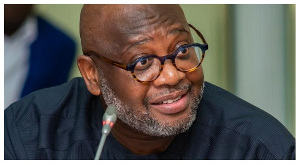The Driver and Vehicle Licensing Authority (DVLA), has introduced a Computer Based Technology (CBT) system for theory driving test, to replace the manual driving test system that had been used over the years as well as manual for basic driver training.
The CBT is expected to promote accountability and transparency in the administration of tests to win the confidence and total support of stakeholders, while the manual would help standardise and better train drivers to help stem the increasing spate of road crashes recorded in recent times.
The written theory test was confronted with problems including fraud, impersonation and leakage of questions, improper storage of questions, human interference and influences hence the introduction of CBT.
The project, the first in West Africa, is a collaboration between DVLA and Fleet Technologies Limited, an on-line information provider.
Alhaji Collins Duada, Minister of Transport, launching the CBT system and the manual in Accra on Wednesday, commended the Board, management and staff for introducing the reforms.
He said DVLA was positioned by its mandate to demonstrate its commitment towards casualty reduction, as it superintends on all issues relating to driver and vehicle licensing as well as their management.
Alhaji Duada said: “I have noticed with pride and joy that the scheme we are launching today is a partnership between the Authority and Fleet Technologies Limited who, I am informed, provides on-line information for the West African Examination Council which allows students and organisations to access their results, perform all on-line registration and validate results.
“With that background and experience, they should be able to help the Authority to succeed in their quest to reform and introduce new processes in Driving Licence Administration,” he said.
Alhaji Duada said such partnerships should be encouraged as they allowed partners to draw upon the strengths, skills, knowledge and resources of each other because "what each can do alone is so much less than what all can do by working together in partnership. Such partnerships should, therefore, be encouraged”.
He said road safety was driven by the need to find answers to clearly defined problems across the whole spectrum of road safety and traffic management.
Alhaji Duada advocated legislative and regulatory measures to tighten standards and rules to ensure safety on the road, and commended the Board of DVLA for developing proposals on probationary licensing systems as well as driving schools and driving instructor regulations.
“It is my expectation and that of the entire country that, when the Authority is able to complete the automation process, it should be in a better position, together with the courts, to manage and keep surveillance on drivers to ensure that only disciplined and law-abiding drivers use our roads,” he said.
Mr Justice Amagashie, Chief Executive of DVLA, said the problem of road carnage was enormous and no single institution could solve it alone, and called on the public to help curb the problem.
He said introduction of the CBT system was to reduce to the barest minimum human interventions, influences and interferences in the driver licence administration.
“No system is static but continuous review would lend a lot of credibility as to what we do as an Authority,” Mr Amagashie said.
He said the introduction of the new scheme, demonstrated the DVLA’s commitment to meeting the obligation towards casualty reduction.
“In embarking upon this journey, we are mindful and informed of the challenges in introducing change in organizational activity and the public at large,” Mr Amagashie said.
Mr David Adom, Board Chairman of DVLA, said in addition to the immediate benefits from the CBT system and the manual, it was believed that the two initiatives would go a long way to correct some of the negative perceptions that the public had about the Authority.
He said within the context of the Road Traffic Act and in accordance with practices worldwide, the Board had decided that the Authority should farm-out aspects of its services that could easily be provided by the private sector.
Mr Adom said: “In line with this new thinking, it has been decided that the Authority tests all vehicles from 3.5 tonnes and above within the Greater Accra Region while the private sector takes over the testing of all other types of vehicles.
“The Authority will however, continue to test all class of vehicles in all the Regions and Districts outside of Accra where, for now, the private sector is not operating,” he said.
Mr Adom announced that, through the instrumentality of a Board member, European Union was willing to assist the Authority undertake diagnostic study of the driving licence administration, to strengthen the knowledge base of driver examiners and lead to the application of international standards in driving testing.
Reverend Erasmus Amankwah Addo, President of Ghana National Association of Driving School, commended the Authority for the efforts, and called on the public to appreciate the new technology to limit road carnage.**
Regional News of Thursday, 26 April 2012
Source: GNA
















